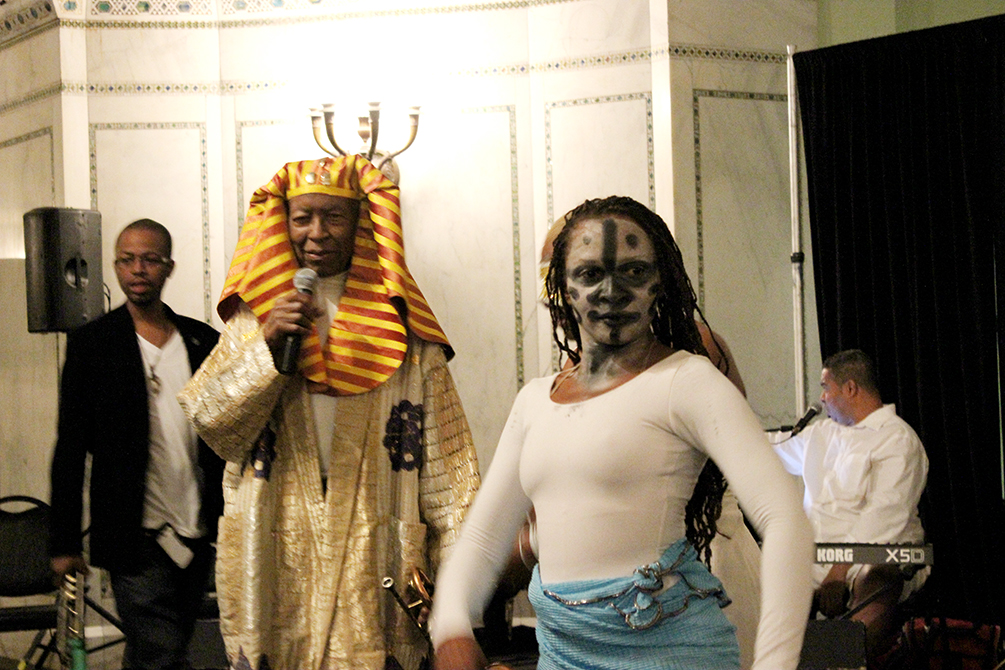
There are musicians, and there are maestros; there are those who merely play, and there are those who direct, invent, and invoke new worlds. There is no doubt that South Side jazz legend Kelan Phil Cohran falls squarely in the latter category. Beneath the majestic dome of the Chicago Cultural Center’s performance space, dressed in an Egyptian-inspired, golden headdress and lit up by astronomical projections, Cohran does not look like a musician, but rather like a deity-in-training, or a trainer of deities.
Although Cohran’s show at the CCC on Halloween was entitled “A Cosmic Expression,” the space-age projections did not come on until the very last song, a twenty-minute trance-inducing piece called “The Black Whole.” The rest of the show was a hodgepodge of everything from campfire folk tales to thumping brass numbers, with a whole breadth of material in between.
For most of the first set, Cohran sat in the rear, majestically stroking his harp. He began the night by reflecting on Chicago as “the greatest city in the world.” Looking around the room, he recalled studying musicology in the very same room in 1953. A smile grew between wisdom-wrinkles on his face as he introduced the first number, a sublime slave spiritual, “Sometimes I Feel Like A Motherless Child,” sung by cosmic diva and Cohran protégée Fanta Celah.
A current of bliss and soothing strings ran through the rest of the first set. One of the set’s highlights was an incredible ode to summertime Ethiopia, featuring two dancers who weaved and twirled through the crowd, as well as a chilling recitation of the timeless poem “Ships That Pass In The Night” by Paul Laurence Dunbar—a perennial favorite of Cohran’s—read by Josefe Verna. Cohran closed the first set by reciting an ode to Ethiopia. As he read the ode aloud, his cadre of musicians, dressed in all white, backed him like a chorus of angels.
At the start of the second set, Cohran and his company were relieved by the Hypnotic Brass Ensemble, a nine-piece brass band from the South Side. Eight of the nine members are sons of Phil Cohran.
When Cohran introduced his kin, he commented on the fact that he hadn’t raised his children in the comfort of the suburbs. In the back of the Cultural Center, a few members of the audience began chanting “South Side! South Side!” Standing in a line and bobbing ferociously, the ensemble played three songs, which, true to the band’s name, seemed to throw the audience into a series of explosive trances. Several members of the crowd stood up and started dancing as if compelled while tubas and trombones blared at full force. The ensemble’s second tune, a flagship six-minute piece called “Balicky Bon,” had some listeners jumping around and giggling.
When the ensemble had finished their set, Cohran stood up and joined them at the front of the stage to recite (again from Dunbar) “A Cabin Tale,” an outlandish folk tale about a bear and a weasel. Cohran stalked the stage and flailed his arms and screamed and squealed the voices of the tale’s different characters. At eighty-six years old, Cohran still shouts and dances with the best of them, and still sizzles with energy when in the throes of his music. Watching him orchestrate “Boon to a Loon,” I got the sense that I was in the presence of someone mythic.
Cohran’s true status as a jazz divinity, however, was not fully realized until the lights went down and “The Black Whole” began. The sprawling piece incorporated singing, shrieking, string music, percussion, and dance; Cohran and his band were illuminated by purple projections of constellations and nebulae. When the piece finally came to an end, I, and most of the audience around me, shivered as if waking from a deep sleep or a long trance.
Otherworldly pan-African space-jazz might be an acquired taste, but anyone in Phil Cohran’s presence for an hour has to conclude that what he produces is something a little more than just music. His songs are gathering spaces. This is something not every musician can do: fuse spirit and talent with a history that is simultaneously earthly and cosmic.
When I approached him on stage after the show, I was struck dumb by Cohran’s serenity.
“Do you know why you were born?” he asked me when I introduced myself.
“I don’t know,” I stammered.
“Well, you better start lookin’.”
“Phil,” I asked, “I have to know. How have you been doing this for so long? What compels you to make music?”
He put his hand on my shoulder. “I don’t know how you don’t make it.”
